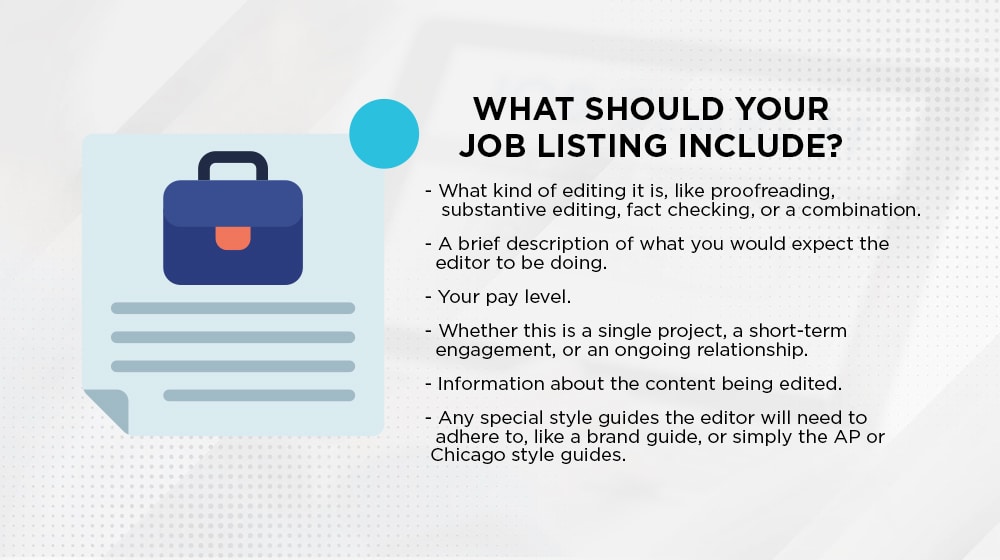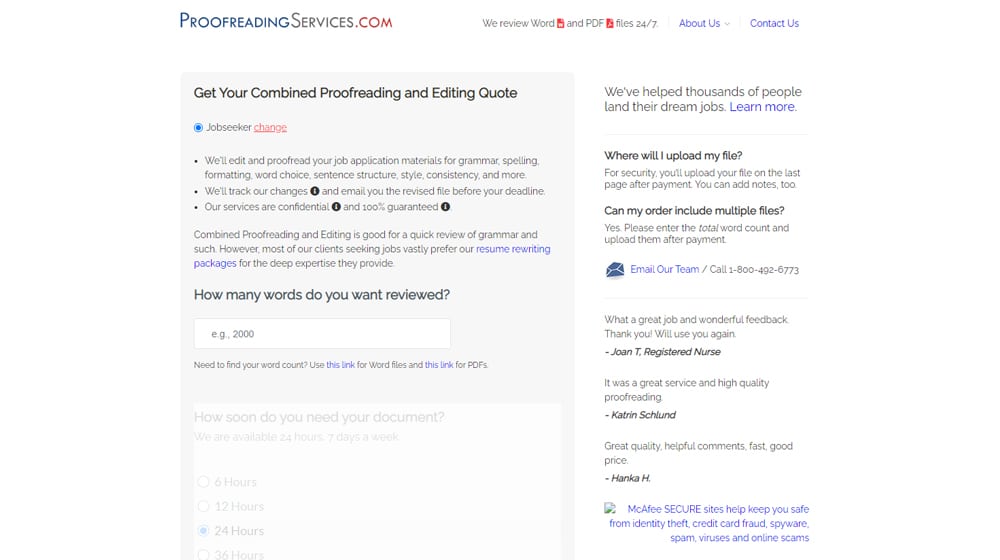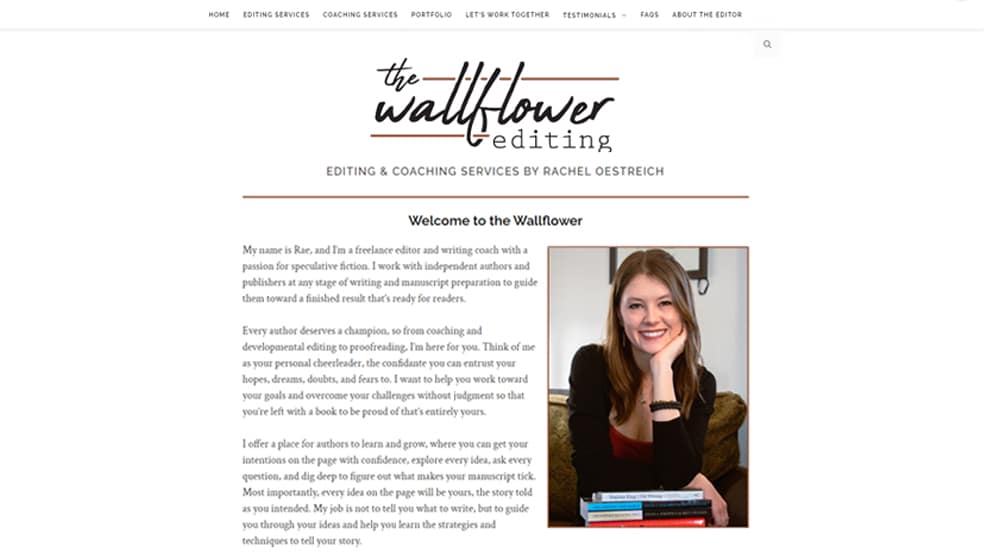Online writing and content creation isn't the only thing you need for a good blog or content creation pipeline. Just as essential – if not more so, depending on how you look at it – is the editor.
Even that statement is not the whole of it because there are different kinds of editing.
The story also changes depending on whether you're an editor looking for work online or you're a business in need of editing services. I'll try to cover both angles here today.
First, let's talk about the business perspective.
You have writing, either of your own or that you purchased from another freelance writer. Now, you need that writing edited. How can you get it done?
The first option is to do it yourself with machine editing tools. Tools like Grammarly, or the built-in editing and spellchecking tools in MSWord or Google Docs, or other tools like Ginger, Wordtune, or Hemingway.
This option is fine if you're just looking for basic proofreading and want to make your writing sound "normal," but it's far from what professional editing entails. You can also hire a dedicated proofreader who can catch errors that tools cannot (and can ignore "issues" that are a matter of style). More on that later.
Manual editing is a bit more intense. Real editors do things like:
You may also want specialized editing, such as sensitivity editors, substantive editors, or fact-checkers.

All of these roles are distinct, though talented editors can do all of it in phases if you work with them to determine what you need. If you're unclear about what you need or what any of this entails, I have a whole guide to editing and proofreading you can read.
 So, there's step one: learn about the different kinds of editing, and determine what kind of editor you need.
So, there's step one: learn about the different kinds of editing, and determine what kind of editor you need.In general, you can use machine tools, software, and your own eyes to proofread basic content. Ad copy, social media posts, and short content for things like brochures; this is all fine to do yourself. You don't really need to hire a professional editor just to streamline 200 words on Facebook, right?
On the other hand, what kinds of content should you get professionally edited?
When in doubt, feel free to consult an editor.
Step two is to create a job listing. Even if you aren't going to use it on job portals like Indeed, it can be a key part of pitching your job to prospective freelance editors.

What should your listing include?
About pay rates. First, you choose a payment model. Editors usually work on either salaried, hourly, per-project, or per-word systems. Which one depends in part on the editor's preferences and in part on yours. Salaried, obviously, is a full employee hire. Hourly can be, or it can involve the editor invoicing you for the time they spent editing. Per-word and per-project are also options, and common options at that, though they may also have minimums to avoid nickel-and-dime pricing for things like social media posts or ad copy.
You can read more about pricing models and pay rates in my guide to editor payments here. Also, consider browsing career sites and freelance hubs to see what the going rate is for comparable work, so you know what you should be paying.
Once you have your job listing set up, decide whether you want to post it passively, actively seek freelancers, or both.
Passively posting your job listing means putting it on sites like LinkedIn, Indeed, Monster, FlexJobs, and other career portals. This is often most used by companies looking to actually hire people as employees, but not always, so you can still get freelancers through those platforms. You can also list the opportunity on your website and career portal. Note that you can also use sites like Upwork to post job opportunities for freelancers to browse, which makes it one of the best sites for editing out there.
Alternatively, you can go to sites like Upwork and Freelancer and find professional editors. Many freelance professionals have profiles on these sites and will tell you their specialties, skill levels, and expectations for pay. Find the ones that most closely align with your needs, and pitch them.
When you have candidates in mind, whether they applied to you or you pitched to them, you'll want to test their abilities. You can do this with a standard piece of your writing and your style needs, or you can intentionally introduce errors and issues to see if they catch them. Either way, as always, I 100% recommend that you pay for this test to ensure that you get the best efforts out of your candidates.

Once you find an editor that you're satisfied working with, you can negotiate any final pay or expectations and set them to work. Good luck!
Freelance editing can be a lucrative career if you're good at what you do. You may be a generalist copyeditor, a specialty fact-checker, a proofreader, or someone somewhere in the middle. It's important to know exactly what you can and can't do so you don't get in over your head and end up needing to do a ton of original research to fact-check something you have no business being authoritative with in the first place.
Finding editing jobs isn't terribly difficult, but finding good editing jobs can be much harder.
First, it pays to set up profiles on the major freelance hubs. Freelancer.com, Upwork.com, and even Fiverr can all be good options. The more places you have a profile, the more exposure you have to potential clients and the more potential work you'll be able to get. Make sure to set your expectations for clients accordingly.

Alternatively, you can start trawling the job boards. LinkedIn Jobs, Indeed, Monster, WeWorkRemotely, FlexJobs, and other sites (as well as simple Google searches) can find places where companies or individuals post their needs for editors.
If you want to specialize, you might also consider certain niches. For example, PolishedPaper is a site dedicated to proofreading and editing academic papers. You can also find specific jobs for editing video scripts, podcast scripts, and other kinds of scripts. These require a special skill set, but if you have it, they can be exceedingly lucrative.
Many companies will want to test your skills to evaluate them before they pick you up for a full project. This is a little less common with editors than it is with writers, but it still happens. If it does, be sure to ask for compensation. No one wants to work for free, after all! It's also a common scam for a "test" to turn out to be the only thing they actually wanted to be edited.

Sometimes, a test is just a standard paid project. Other times, it might be a piece they deliberately added issues into to make sure you catch them.
You may also consider developing a system to write about and justify your edits, whether through comments or just through a document. This is rarely actually necessary, but for a test, it can show you're serious.
Freelance writing has what are known as content mills. These are sites where writers sign up and claim assignments from open pools of client work, and it's all first come, first served. Well, there are two related opportunities here for editors.
The first is to work with these content mills. Sites like Textbroker hire editors as well, though in much smaller numbers, to be a first-line proofreading system and value add to their clients. You need to pass certain editing tests, and they aren't always hiring, but it can be a good gig with regular work if you can get it.

The other option is the mill structure for proofreading. Sites like Gramlee, Wordvice, and ProofreadingServices.com all work on a similar model. You prove your editing chops in a test when you apply. Once you're in, clients post their work to be edited, you edit it, and you get paid. It's simple, it's effective, and it has one major drawback.
That drawback is that you don't really build a relationship with clients, and so there's no promise of ongoing work or increased compensation over time. It's good for money as you need it, but it's not great for a career.
Another option is to build your own website and promote yourself as an editor for hire. It's easy enough to set up a simple website (there are thousands of guides out there; I recommend WordPress), and then all you need to do is monitor your email and promote yourself online.

Sites like Twitter are great for this. There are always people posting about needing editors on social media; the trick is finding the ones who are willing to pay. A fanfiction author complaining about not wanting to edit their work probably doesn't have the budget, but a company posting about needing a good editor could be.
You can also pitch yourself to companies. Especially if you spot a typo or other issue on their site, you can email them about it and pitch yourself as an editor for hire. It's not a reliable or even hugely effective strategy, but all it takes is one good bite to kick-start a career.
Whether you're on the editing or the business side of the coin, you need a contract to work with your freelancers. Contracts are essential in freelance writing, and they're critical for editing as well.

Just like with writing, editing contracts need to include certain elements. The biggest are the scope of work and the price points, as well as deadlines and agreements for one-off projects as necessary. Define the payment type, the pay rates, whether it's a one-time project or an ongoing relationship, and so on. There are plenty of templates available online to start you out, too.
Editing is an essential part of content creation, but it's overlooked far too often when companies are already squeezing their budget to hire writers. Good editing can make a significant difference, however, and even having multiple layers of editors for proofreading, substantive editing, and other kinds of editing can be a great idea.

If you have any further questions about either hiring editors or getting hired as an editor, feel free to ask in the comments below! My expertise is available, and I'd be more than happy to answer any of your potential questions as they come to mind!
We encourage you to share this article on Twitter and Facebook. Just click those two links - you'll see why.
It's important to share the news to spread the truth. Most people won't.